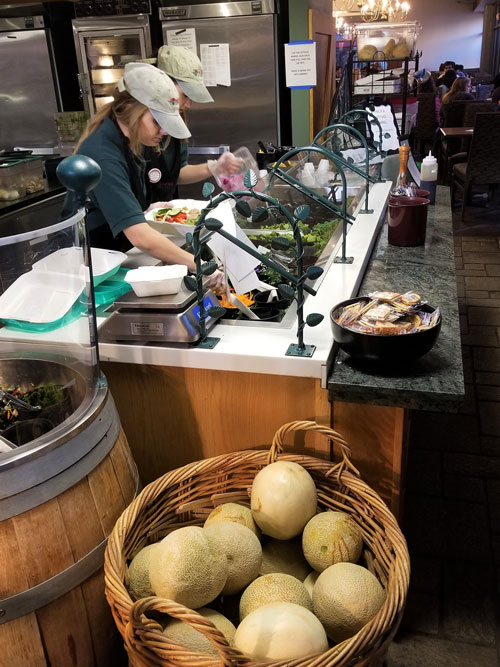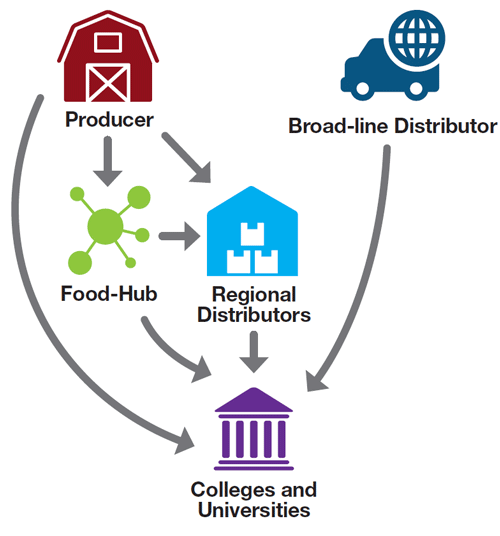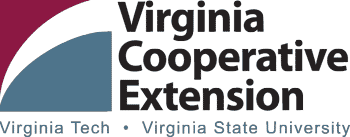Accessing Virginia’s Markets: Colleges & Universities
- Introduction
- Survey Findings
- Purchasing Priorities & Barriers
- Recommendations
- Producer Checklist
- Helpful Resources
Introduction The College and University Market Sector is very unique in the sense that it can charge what it wants while still maintaining a steady demand. Why? Most freshmen at colleges and universities are required to both live on campus and purchase a meal plan, a meal plan of which has a fixed amount, and the plan only binding itself to the dining hall(s) on campus. In lieu of this required purchase, universities like Virginia Tech both ask for and attentively listen to the student’s responses about their dining experiences and requests. With the current millennial generation being the majority in colleges and universities today, we can assume one thing: a greater demand for healthier, locally grown, “natural” foods. The millennial generation today not only takes up the majority of the United States’ population by composing 26% of it, but they’re also the most health-conscious and active generation, meaning demands for healthier foods. To the average consumer, healthier foods are often perceived to be locally grown foods. Knowing this demand, growers like you can perhaps penetrate the market sector for universities and colleges in order to meet the demand of millennials in one way or another.
The College and University Market Sector is very unique in the sense that it can charge what it wants while still maintaining a steady demand. Why? Most freshmen at colleges and universities are required to both live on campus and purchase a meal plan, a meal plan of which has a fixed amount, and the plan only binding itself to the dining hall(s) on campus. In lieu of this required purchase, universities like Virginia Tech both ask for and attentively listen to the student’s responses about their dining experiences and requests. With the current millennial generation being the majority in colleges and universities today, we can assume one thing: a greater demand for healthier, locally grown, “natural” foods. The millennial generation today not only takes up the majority of the United States’ population by composing 26% of it, but they’re also the most health-conscious and active generation, meaning demands for healthier foods. To the average consumer, healthier foods are often perceived to be locally grown foods. Knowing this demand, growers like you can perhaps penetrate the market sector for universities and colleges in order to meet the demand of millennials in one way or another.
Through a research study conducted through Harvard’s Food Law and Policy Clinic, the contributors highlight the importance of how universities and colleges should be capitalizing on the increasing demand of buying and eating local. They recommend that state colleges and universities gain a “competitive edge” by being more transparent with their food procurement practices. This in turn could raise the colleges’ and universities’ public ranking and would therefore give themselves a competitive edge in student recruitment.
Survey Findings
The college and university sector represents a greater level of complexity in the actual procurement of food. Across Virginia, there are about 60 public and private universities, excluding community colleges. Since larger institutions, like colleges and universities, are typically connected to larger, broad-line, food service companies, the survey showed that less than 10% of produce was sourced locally. Because of these existing relationships and other major hurdles, like volume, deliverability of product, and food safety policies, these institutions were limited in their ability to make business connections with local producers. In cases where institutions had greater flexibility and commitment to sourcing more locally produced food, they were open to establishing new ties. Growers would need to talk to the directors of dining services to figure out who their current suppliers are, as well as what interest lay in outsourcing from a local grower.
Purchasing Priorities & Barriers
Priorities
- Price
- Availability
- Grower/Producer Liability Insurance
- Food Safety Certification
- Quantity/Volume
- Quality/Consistency of Product
- Deliverability of Product
Barriers
- Insufficient Volume of Product
- Lack of Intermediaries (Food Hubs, etc.)
- Delivery Capabilities (Timing, Flexibility, etc.)
- Grower Lack of Understanding of Buyer Requirements, Needs, and Processes
- Colleges and universities often work with large nationwide food service companies that follow strict corporate parameters on food procurement. In rare cases, where institutions may not be tied to a food service company, such as Sodexo or Aramark, it may be easier to tap into this market.
- To determine what universities need, it is imperative to establish effective communication.
- Be cognizant of large volume needs of particular institutions, since selling to them means being able to provide a consistent flow of product and meet exacting quality standards.
- Obtaining and maintaining third-party food safety certification is often standard practice in the institutional market, so it is likely more Virginia-grown produce would be purchased if food safety certification requirements were met by more Virginia growers.
- It is important to ask a potential buyer specific questions about what audit schemes they require, and whether they have an onboarding policy that allows for transition time to achieve higher levels of certification.
- Be aware that comprehensive liability insurance may also be a necessity in this market.
- Become familiarized with other federal produce safety regulations (like the Produce Safety Rule) and understand how they affect you as a local producer.
- More colleges and universities want to purchase locally-sourced product. Thus, additional certifications, such as “Fair Trade” and “National Organic Program”, may boost your marketability as a local producer.
- You may need to be flexible on your delivery schedule, making sure to accommodate the institution’s needs and timetables, especially since doing so can give you a competitive advantage.
- Does the institution have a contract with a larger food service company?
- Are you able to meet the volume demands of the college or university?
- If meeting volume demands is challenging, have you considered using a local food hub or other intermediaries to better meet the volume needs and also alleviate possible logistic issues such as transport and delivery?
- Do you need a 3rd party food safety audit, such as Good Agricultural Practices (GAP) certification in order to sell your product to this institution? GAP certification is the biggest one when it comes to produce.
- Are there are food safety requirements such as needing to have a HACCP (hazard analysis and critical control point) plan implemented in your operation?
- Is a minimum level of liability insurance required?
- Are you able to be punctual in terms of delivery, should you choose to transport your own produce?

Farm to Institution New England (FINE)
Learn more about the many initiatives taking place in New England.
Some of the exciting FINE work relevant to market access include the following links:
- Campus Dining 101: A Benchmark Study on Farm to College in New England
- Getting it There: Understanding the Role of New England Food Distributors in Providing Local Food to Institutions.
- Producer Perspectives: The New England Farm-to-Institution Market
Harvard Food Law and Policy Clinic
Tools for Advocates: Increasing Local Food Procurement by State Agencies, Colleges, and Universities.
State Council of Higher Education for Virginia A website providing lists of the different types of colleges and universities in the state of Virginia.
